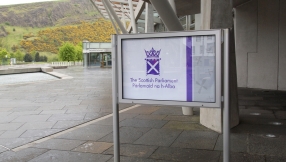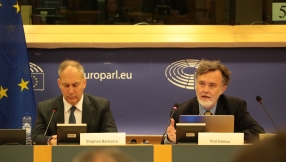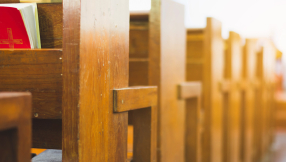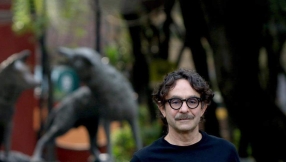This coming Palm Sunday has an even more poignant meaning than usual for Egypt's Coptic Christians who make up some 10 per cent of the country's Muslim-majority population.
For it recalls the horrific church bombings on April 9, 2017, which killed at least 45 people and injured more than a hundred.
Twin suicide bombings, claimed by Islamic State, took place at St George's Church in the northern Egyptian city of Tanta on the Nile Delta, and at St Mark's Coptic Orthodox Cathedral in Alexandria, which is the seat of the Coptic papacy (Pope Tawadros II, the leader of the Coptic Orthodox Church, was inside St Mark's Church but was not harmed).
Security will be especially tight around the Palm Sunday church services, with the added tension that they take place immediately after presidential elections which begin on Monday 26 and last for three days. The contest is between the incumbent president Abdel Fattah al Sisi and the little known El Ghad party chair, Moussa Mostafa Moussa.
It was Sisi who, the day after the attacks, formally decreed a three-month state of emergency. This, approved unanimously by the country's parliament on April 11, gave the armed forces responsibility for preserving security throughout the country and protecting private and public property.
Egypt's emergency law, which dates back to 1958, gives the authorities sweeping powers to arrest, detain, try, and sentence suspects with almost no judicial review. It was last used in June 2012, when the government allowed it to expire more than a year after a nation-wide uprising as part of the so-called 'Arab Spring' swept up the long-time former leader Hosni Mubarak.
Though in response to the attacks on Christians, the latest crackdown has not benefited the Coptic population, who groups such as Human Rights Watch (HRW) say face widespread legal and social discrimination and are routinely denied high-level government and security services jobs.
As HRW has said: 'They [Coptic Christians] have been the victims of increasing sectarian attacks since the 2011 uprising, particularly since July 2013, when the military removed Mohamed Morsy, Egypt's first freely elected president.'
And HRW continues to document how interior ministry officials and prosecutors fail to conduct proper investigations or prosecutions into sectarian attacks on Coptic Christians.
The immediate background to the twin attacks is that, in February 2017, ISIS called for attacks on Christians, and during the Sinai insurgency, hundreds of Christians fled their homes in the North Sinai.
Sisi had recently returned from a trip to the US to visit President Donald Trump, in which the two leaders underlined their joint resolve against ISIS.
In the event, security was not as tight as it could have been at the churches. In Tanta, a man wearing concealed explosives managed to pass through a security checkpoint outside St George's Church and detonate himself near the front pews, killing at least 28 people and wounding 77.
In Alexandria, footage from a church security camera showed another bomber trying to enter St Mark's through an open gate and being directed toward a metal detector which was guarded by police officers. Stopped by an officer, the man then detonated his explosives, killing at least 17 people and wounding 48.
This Palm Sunday, which falls on the West's Easter – April 1 – Christians will be hoping that such atrocities will not strike in the same place two years in a row.
But they face a fierce enemy still.
According to the New York Times, 'The Islamic State...most likely ordered it precisely to provoke such questioning in the most painful way possible. The goals were to fan the sectarian discord between Christians and Muslims in Egypt and the world, to undercut Mr Sisi's pledges to resist Islamist terror and defend the Christian minority, and to spread fear throughout Egypt on the eve of a papal visit.'
This is doubtless correct, but another, simpler motive should also not be ruled out: fundamental, and deadly, opposition to Christians for being Christians.













